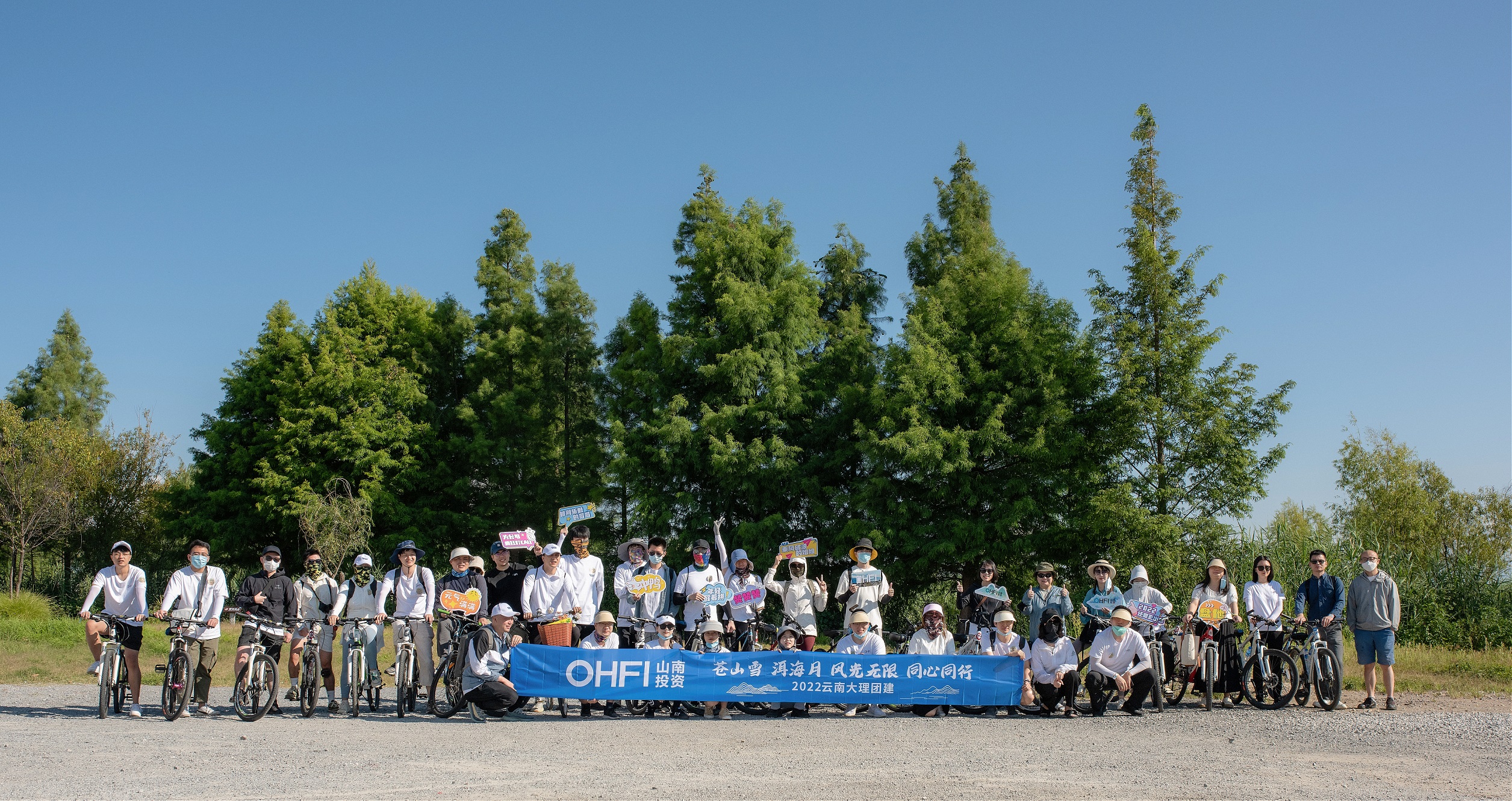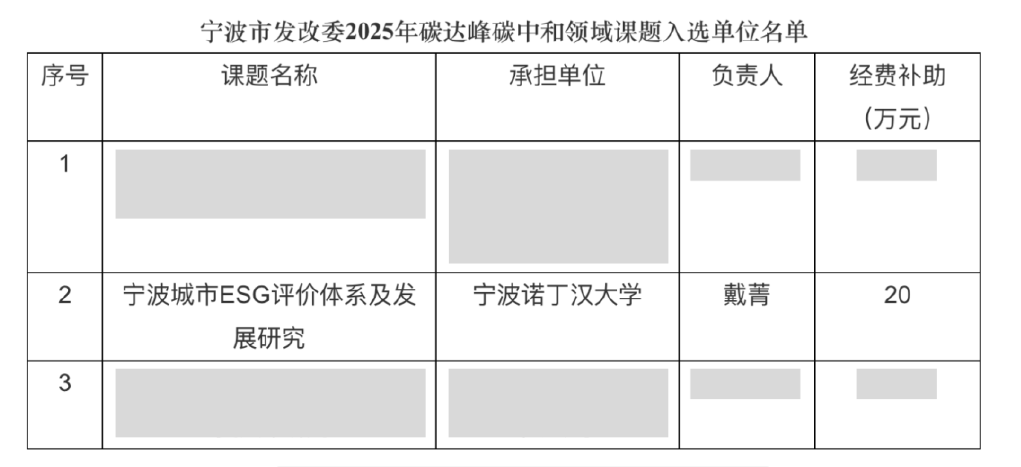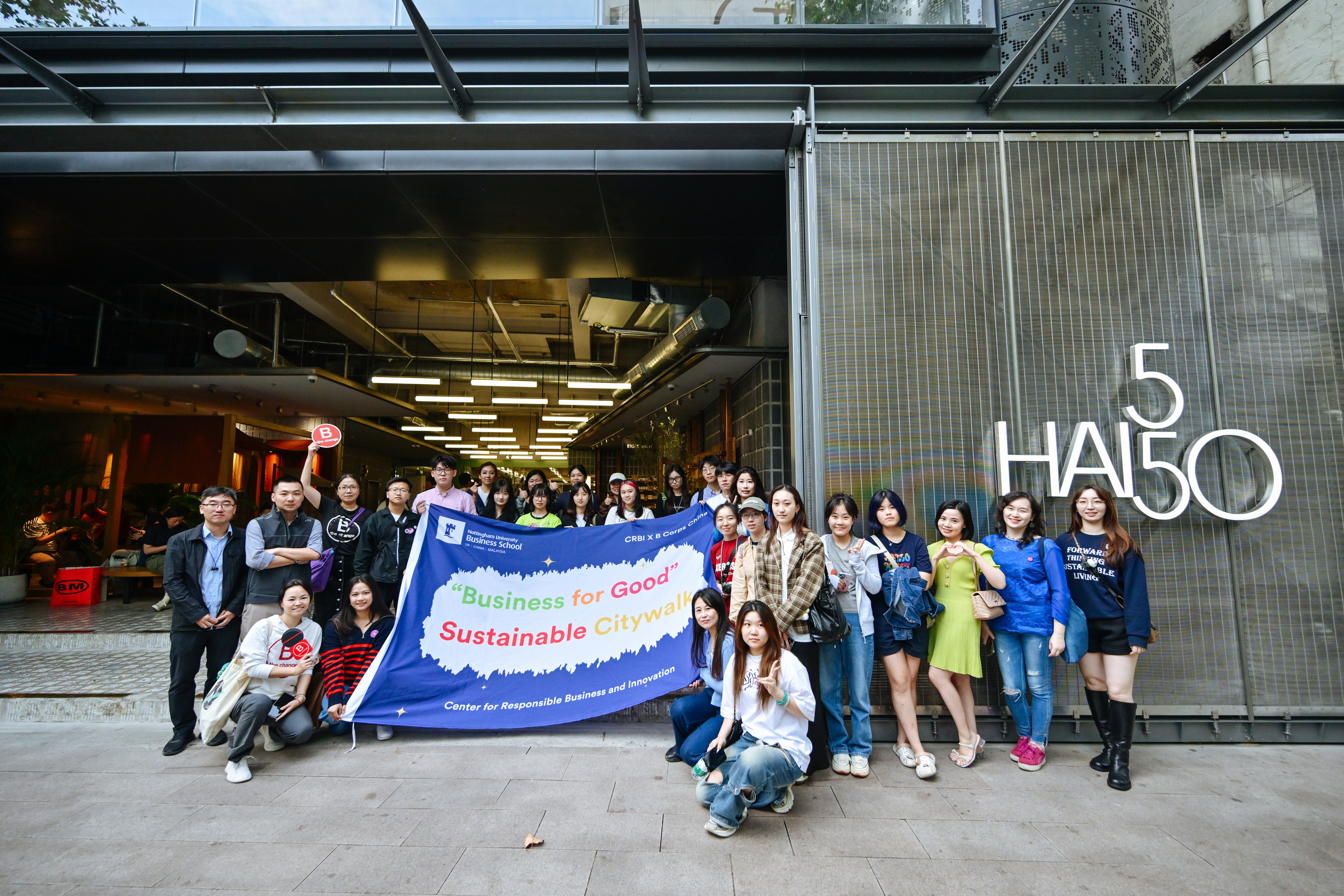Meet what we are doing for a sustainable impact in responsible business practices!
Key Project 1: ESG-Enabled Sustainable Development Programme for Manufacturing Sector
The project is based on the“The Evaluation Specification for Environmental, Social and Governance (ESG) of Manufacturing Enterprises“ (Standard No.: T/NBJN 0002-2024) compiled by the Centre for Responsible Business and Innovation at UNNC. It uses a digital platform that realizes the closed loop of corporate ESG self-assessment, rating and improvement as its engine, and the supply chain ESG management transformation and ESG financial collaboration as the link. It is committed to creating a replicable and popularizable "Ningbo Paradigm" for the sustainable development of the industry.
ESG Group Standards Project
(SDG 7 | SDG 8 | SDG 9 | SDG 12 | SDG 13 | SDG 16 | SDG 17)

"Evaluation specification for environmental, social and governance (ESG) of manufacturing enterprises" is based on national laws, regulations and other national standards, as well as refers to international standards and evaluation systems. It constructs an ESG evaluation guide from the three dimensions of environment, society and governance that is both in line with international standards and suitable for the actual practices of my country's manufacturing enterprises.
From 2024, Center for Responsible Business and Innovation (CRBI) of the University of Nottingham Ningbo China (UNNC), Expert Committee of Ningbo Intelligent Manufacturing Association, Ningbo Orient Wires & Cables Co. Ltd., and Ningbo Zhedong Environment and Energy Exchange (ZDEAEE) jointly formed a standards-drafting team working on the group standard "Evaluation specification for environmental, social and governance (ESG) of manufacturing enterprises". On 13 November 2024, it was successfully released and implemented, which was also China's first group standard about ESG for manufacturing industry. This group standard is under the jurisdiction of Ningbo Energy Conservation Association and Ningbo Intelligent Manufacturing Association, which are also responsible for its implementation.
The establishment of this standard has built a scientific, reasonable, independent, objective, and consistent ESG evaluation index system for Chinese manufacturing enterprises. It helps promote the enhancement of ESG management levels and risk response capabilities of manufacturing enterprises, supports their green and low-carbon transformation and high-quality development, and guides these enterprises in high-quality ESG information disclosure. This alleviates the information asymmetry between investors and investee companies, provides guidance for ESG evaluation institutions, and accelerates the construction of an ESG evaluation system with Chinese characteristics.

The Development of "Evaluation specification for environmental, social and governance (ESG) of manufacturing enterprises"
For futher information about this group standard, please click here.
Project Partnerships:
Ning bo Shi Jie Neng Xie Hui
Expert Committee of Ningbo Intelligent Manufacturing Association
Ningbo Intelligent Manufacturing Association
Ningbo Orient Wires & Cables Co., Ltd.
Ningbo Zhedong Environment and Energy Exchange Co., Ltd.
Digital Platform for ESG Evaluation System of Manufacturing Enterprises (SDG 8 | SDG 9 | SDG 10 | SDG 12 | SDG 13 | SDG 16 | SDG 17)

Developed by the Centre, this digital platform enables enterprises to accurately assess their ESG performance, systematically enhance environmental, social, and governance practices, and achieve high-quality development.
The platform features a robust scientific assessment framework, intelligent management tools, and comprehensive data support. It offers tailored services, including performance improvement recommendations, capacity-building programmes, and authoritative certification. With open collaboration at its core, the platform provides value-added services to meet bespoke corporate needs.
Watch a video to learn more
Supply Chain ESG Management Enhancement Initiative"Blue Carbon Programme 2.0"
(SDG 7 | SDG 9 | SDG 12 | SDG 13 | SDG 14 | SDG 15| SDG 17)

Against the backdrop of global efforts to address climate change and accelerate the green and low-carbon transition, supply chain emission reduction has become a critical pathway to achieving the "Dual Carbon" goals.
In 2025, RCE Ningbo and Orient Cable officially launched the upgraded "Blue Carbon Programme 2.0," which integrates international resources with local practices to establish a collaborative "government-industry-academia-research-application" mechanism, actively promoting the transformation of corporate ESG management and contributing Chinese wisdom to the global Sustainable Development Goals (SDGs).
Previously, as a leading enterprise in China's marine energy and power transmission systems sector, Orient Cable actively responded to national strategies by initiating the "Blue Carbon Initiative 1.0" in 2024 in partnership with industry chain stakeholders. By building a green, innovative, and transparent supply chain system, the initiative has driven coordinated carbon reduction across upstream and downstream sectors and productions, achieving remarkable results.
Project Partnerships:
Ningbo Orient Wires & Cables Co., Ltd.
ESG Financce Strategic Collaboration
(SDG 8 | SDG 9 | SDG 10 | SDG 12 | SDG 17)

The Centre has officially entered into a strategic ESG finance cooperation with Ningbo Branch of Industrial Bank Co., Ltd.
The two parties will collaborate in various ESG finance areas, including the application of the Environmental, Social, and Governance (ESG) Evaluation Standards for Manufacturing Enterprises, green credit and ESG-specific financing, ESG financial research, promotion of ESG finance concepts, talent development, and international exchanges. Together, they aim to support manufacturing enterprises in achieving synergistic development in environmental benefits, social responsibility, and corporate governance.
Project Partnerships:
Industrial Bank Co., Ltd.
Key Project 2: Sustainable Development Collaboration with smart Automobile
smart, a pioneering global brand in electric and intelligent mobility, has always placed sustainability at the heart of its strategy, driving the industry's green transformation through technological innovation and open collaboration. This sustainable development collaboration project with smart Automobile employs competitions, academic research, and corporate engagement to connect industry partners, young talent, and global user communities. Together, we explore optimal solutions for operational and mobility futures that align with ecological balance, striving to establish as sustainable mobility ecosystem that harmonises technological sophistication with environmental responsibility.
Partnership:
smart Automobile co., Ltd.
Key Project 3: OHFI ESG Hub Project
OHFI ESG Hub Project
(SDG 4 | SDG 7 | SDG 8 | SDG 9 | SDG 12 | SDG 13 | SDG 17)

Olympus Hedge Fund Investments Co., Ltd. (OHFI) was established in 2014 with the Asset Management Association of China (AMAC) registration number P1006249. With a registered capital of 106 million RMB, the company has approximately 80 employees and maintains offices in Hangzhou, Shanghai, and Beijing. The company specializes in the asset management sector, with its invested and controlled subsidiaries primarily engaged in businesses such as quantitative private funds, proprietary quantitative trading, and platform-based multi-fund manager private funds. Collectively, the company and its invested/controlled subsidiaries manage assets totaling over 9 billion RMB.
OHFI Asset Management as a donor, has partnered with the Centre to launch the EsG HubProject, focusing on the interactive relationship between ESG (Environmental, Social andGovernance), Artificial Intelligence (AI) and Sustainable Development (SD) , promoting the deepintegration of sustainable development goals and them, and helping to create the long-term well.being of mankind and the earth.
Partnership:
Olympus Hedge Fund Investments Co., Ltd.
Related event:
AI for Sustainable Future" Competition
Other Projects
2025 Summer Student Research Project on Supply Chain Carbon Footprint
(SDG 4 | SDG 7 | SDG 8 | SDG 9 | SDG 12 | SDG 13 | SDG 17)

This project falls under the academic component of Sustainable Development Collaboration Project with smart Automobile.
Through a series of activities—including industry-academia trainings, on-site research at the smart Automobile supplier, the development of carbon footprint accounting models, the preparation of standard-compliant product carbon footprint reports, and the exploration of theoretical and practical mechanisms for synergising supply chain operations with carbon footprint optimisation in cutting-edge literature—it aims to equip students with advanced research knowledge and skills, empowering the next generation of academic talent.
Partnership:
smart Automobile co., Ltd.
Pinghu Zhongli Automotive Co., Ltd.
Related event:
smart Global Store Sustainable Operation Design Competition
Report:
2025 Ningbo City ESG Evaluation System and Development Research Project
(SDG 1 | SDG 7 | SDG 8 | SDG 9 | SDG 10 | SDG 11 | SDG 12 | SDG 13 | SDG 16 | SDG 17)

The Ningbo Development and Reform Commission is a comprehensive economic management agency under the municipal government. It is primarily responsible for formulating city-wide development plans, coordinating major construction projects, advancing economic system reforms, promoting regional development (e.g., Yangtze River Delta integration, Ningbo-Zhoushan cooperation), formulating industrial policies, managing energy and pricing, and optimizing the business environment. As a key functional department, it drives Ningbo's high-quality economic and social development.
Commissioned by the Ningbo Development and Reform Commission, this research project focuses on conducting continuous evaluation and tracking of the urban ESG assessment system, compiling the Ningbo High-Quality ESG Development Report, and establishing a visual and quantifiable ESG evaluation index system for urban development. Through the continuous improvement of urban ESG evaluation, the project aims to promote comprehensive upgrades in urban industrial structure, urban-rural development, ecological environment, common prosperity development, and technological innovation.
Project entrust organisation:
Ningbo Development and Reform Commission
"Business for Good" Project
(SDG 4 | SDG 11 | SDG 12 | SDG 17)

B Corps (B Corporations) is a concept proposed by B Lab. It selects a group of for-profit enterprises that meet high standards in social and environmental performance, transparency, and accountability through the B Impact Assessment (BIA). Currently, there are more than 9,000 B Corps worldwide, spanning over 160 industries, and they are committed to using the power of business to address social and environmental issues.
As an integral part of material life, corporations are a significant force in promoting environmental and social welfare. The Center for Responsible Business and Innovation (CRBI) has teamed up with B Corp China to organize visits to globally leading sustainable B Corp stores, allowing participants to gain firsthand understanding of sustainable business practices.
Project Partnership:
B Corps China
Related events:
"Business for Good" Sustainable Citywalk I
"Business for Good" Sustainable Citywalk II
Summer Student Research Project on ESG Finance 2024
(SDG 4 | SDG 7 | SDG 8 | SDG 13)
Global capital is undergoing a wave of value reconfiguration. Sustainable development has long been a global focal point. Today, with ESG investments surpassing $40 trillion, mastering sustainable financial analysis has become an essential skill for the next generation of business leaders. The ESG Finance Project was proposed and planned by Professor Jing Dai, Director of the Centre for Responsible Business and Innovation (CRBI), and was co-planned and developed by Dr Youzong Xu, Assistant Professor inEconomics at Nottingham University Business School China.
Dr Ying Jiang, Associate Professor in Finance at Nottingham University Business School China, conducted the first offline training session for participants. The training focused on key areas such as ESG evaluation metrics, rating agency comparisons, literature review, and database utilisation, aiming to establish a robust foundation of ESG knowledge. In the second training session of this Summer Student Research Project on ESG Finance, CRBI invited Dr Liang Dong, Assistant Professor in the Department of Public and International Affairs at the School of Energy and Environment, City University of Hong Kong, to deliver an online lecture titled "Carbon Emissions in the Financial Sector: Concepts, Accounting Methods, and Policy Implications". The project mentorsand student research assistants collaborated closely, and after four months of data analysis, they produced a comprehensive research report in Spring 2025. This study estimates two types of investment and financing activities for 19 major banks inChinese mainland. Given the availability of industry carbon emission factor estimation data and in line with the estimation years of other financing carbon emission reports in the industry, this report estimates the financing emissions of commercial loans and residential mortgages for 12 industries in December 2021.
Equipped with cutting-edge knowledge and skills from the training, students are now better prepared to engage in future academic and research endeavors. The project has garnered wide spread acclaim among participating students. Notably, aparticipant has received an offer from international universities for a relevant degree programme, having strengthened the applications through this research initiative. This outcome significantly enhances the project's practical value.
View report: Financial Responsibility in the Climate Crisis: Financed Emissions in China's Banking Sector and Reforms for Green Policies
E-waste Project
(SDG 4 | SDG 7 | SDG 8 | SDG 11 | SDG 12 | SDG 13)
The project focuses on the management of E-waste on campus, aiming to enhance students' awareness of the issue, strengthen recycling and management practices, ensure the effective operation of the campus circular economy, and foster a culture of sustainable practices among staff and students. in December 2023, a comprehensive survey on E-waste disposal and recycling was conducted at Nottingham Bridge. In March 2024, Dr Xuan Feng delivered a public lecture introducing the concept of urban mining and the circular economy, while also highlighting the intrinsic connection between urban mining and E-waste management. On 14 April 2024, during the "Green Nottingham" Sustainability Carnival, held on UNNC's 20th Anniversary Open Day, the project team organised an educational campaign to raise awareness about E-waste disposal and recycling processes among students, faculty, and external guests, Participants were encouraged to contribute ideas and suggestions for the optimal placement of E-waste recycling stations on campus.
The report sample compiled by the project encompasses nearly a thousand participants, comprising academic staff and students from three faculties at UNNC, alongside other demographic groups. Findings illustrate the current state of E-waste on campus across three key dimensions: primary sources of E-waste at UNNC, understanding of E-Waste disposal and recycling practices among students, and students’ behaviors regarding E-waste disposal and recycling. The analysis further identifies the core challenges in campus E-waste management at both individual and institutional levels, contributing factors to E-waste engagement, encompassing both objective conditions and subjective perceptions. Additionally, the project team proposes a threefold strategy: upgrade of the E-waste management infrastructure, establishment of an E-waste management framework to promote a circular economy on campus and creation of an official university digital platform dedicated to E-waste management and circular economy.
The project has not only equipped students and staff with knowledge about E-waste disposal but has also introduced scientific E-waste management concepts and measures to the campus, offering valuable constructive suggestions. More importantly, it has planted the seeds of sustainable development in the hearts and minds of the university members, becoming a driving force in UNNC's mission to build a "No-Waste Campus" and injecting lasting vitality into the institution's environmental protection efforts.
Lecture on E-waste Management and Circular Economy
"Green Nottingham" - Sustainability Carnival
Project Partnership:
UNNC Environmental Sustainability Committee
NottinGreen student club
reUNNC staff club
View report: Report on Students' behaviour toward E-waste Disposal and Recycling at UNNC
For more updated activities of the projects above, please click here for more information.